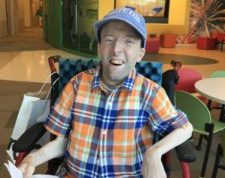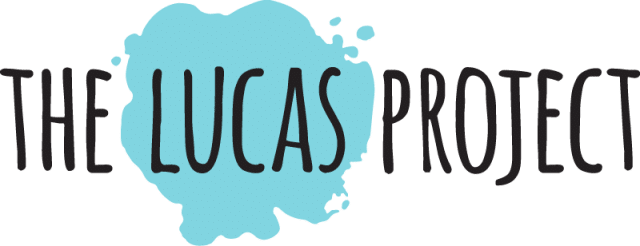
Thank you for your willingness to share your story for The Lucas Project blog! My objective is to raise awareness and shine a spotlight on caregivers and how difficult our role can be. We desperately need support and resources, and the only way we will see change in our communities is by sharing openly and honestly about how lonely, joyful, and exhausting it is to care for a child with special needs.
Let’s start at the beginning. Introduce yourself. Where do you live? What do you do? What does your current family structure look like?
Hello! My name is Deanna Batliner and I currently live in Morristown with my 37 year old developmentally delayed son, Michael. my husband, Paul (Michael’s stepfather) and our Westie, Maxwell. Our families are scattered throughout the States the include Michael’s sister and his two stepsisters, their families and associated animals! I am a per diem occupational therapist and a primary caregiver.
When did you first learn that your child would have special needs? Pregnancy? Shortly after? How did you feel? How do you feel now?
The story begins when I was 21, young and pregnant at a time when medical technology was not as advanced in terms of early detection. I did not recognize my son’s delay until he was about 9 months old. My pregnancy was unremarkable. There were no issues until he was born, though I do remember that unlike his sister ,who was born two years earlier, he didn’t move a lot. It was ultimately determined that his gestation date was incorrect as he was born prematurely in terms of development rather than weight. He weighed 5 pounds and 2 ounces with underdeveloped lungs and could not breath on his own. I remember they took him blue from the delivery room and I was told that he probably wouldn’t make it. Over the next several hours, he stabilized and spent the next month on a respirator until he could be weaned and sent home. That was 1981. Looking back, I know that God has been with me for every step of my Michael journey, including the very beginning.
Can you explain your child’s specific needs and how these affect his and your day-to-day life?
Honestly, I was never overwhelmed with guilt or sorrow during those early years. Michael was just Michael and his abnormalities were a natural acceptance. He met all of his milestones in time, learning to speak, crawl, walk just like any other child really. He just looked different but in an amazingly adorable way. And what made him even more unique, was that he was always small and is still to this day! He maintained his health until his pre teens, as it was then that he began experiencing many orthopedic issues which continue to plague him. These problems are the result of his underlying genetic condition still undiagnosed. During the last 25 years or so, Michael has had extensive spinal fusion to offset severe scoliosis and maximize his lung function. He has became an enteral feeder and cannot eat or drink by mouth because of an aspiration risk and has developed limited heart function due to his underlying neurological disorder.He sleeps with oxygen attached to a non invasive ventilator at night. He sits most of the time due to poor endurance and uses a wheelchair when out in public. His seizure disorder is controlled. But despite of all of the hardships my son has had to endure, he will cheerfully assist with his dressing routine and organize his CD collection daily. I cannot imagine a day without him. It is truly his spirit, smile and God’s grace that keep me going. He has beaten the medical odds so many times that I never run out of testimonies!
What are the biggest worries you face for your child? What are your biggest goals?
My feelings have definitely changed over the years, because when Michael was young I had more confidence in the “system” and a more hopeful heart regarding its capabilities. But with time, our family dynamics have changed, our energy has waned and Michael’s medical needs have grown. The multitude of resources he so freely received as a child no longer apply to him. Among them are early intervention, schools with special classrooms, therapies, home nursing and appropriate day programming. The harsh reality is that these entities become less and less available when you have a medically fragile, developmentally delayed “adult” child. This is incredibly sad because one would expect the exact opposite. We, like many families who are primary caregivers for those who have “aged out” are often burned out and are in desperate need of consistent, reliable respite. I have read that a primary caregiver who is unable to pursue “me” time or self care is equivalent to having PTSD. There are days I most definitely experience that. And, of course, my worst fear is what will happen to Michael when I am gone or worse yet, what will happen to me when Michael is gone. These are dark thoughts I can only push away with my faith.
Presently, my goal for my son and I is to see more opportunities for respite care in the private sector. There is such a a need for medical daycare and overnight respite services to insure socialization and to offset caregiver burn out. This population, while complex, is so deserving of our time and attention, and for those capable of stepping up to the plate, this could be a game changer for so many. One of my dreams is to see a separate group for these folks on Sunday or on Date Night. They could interact with trained staff to experience God’s love through a modified curriculum based on their unique functional level, including immobility. I know, without a doubt, that Michael would love to listen to a Bible story, karaoke to a worship song or dance in a wheelchair based Macarena group just for an hour or two. It’s the little things that mean so much to him and so many like him. That simple “hello” or handshake often make his day and commonly his week given his social encounters are so limited. I am so grateful for this opportunity to share a bit of my Michael story, and I truly believe that the church is our only hope to gain understanding and support for this severely underserved population.
Finally, what is one takeaway you want others to understand about being a parent to a child with special needs?
My biggest takeaway from my Michael journey is that I can’t do it ALL all by myself, a truth I have learned the hard way and believe so much more with age. I recently came across a quote by Helen Keller which states, “Alone we can do so little; together we can do much”. As a lifelong advocate for Michael, I couldn’t have said it any better.
Thank you for “listening”
And, if YOU want to help make a difference in the lives of caregivers, please consider a donation – every little bit helps fund a break for these special needs families.
Just keep livin!
